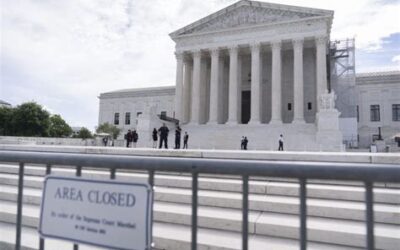Perfectly Legal, But Wrong
When “perfectly legal” is a lame excuse for doing the wrong thing
“Selfies” and a $6.2 Million Banana
My wife and I were at the base of an amazing waterfall in central Costa Rica, and we watched a series of tourists taking “selfies” against a backdrop of rushing water. It reminded me how many people now act like they have to compete with each other to get the “perfect...
And so, the unchecked corruption begins!
“President-elect Donald J. Trump is keeping secret the names of the donors who are funding his transition effort, a break from tradition that could make it impossible to see what interest groups, businesses or wealthy people are helping launch his second term.” From...
Trump 2.0. Oh My!
This time, at least, Donald Trump won fair and square. But the people have spoken, placing trust in a person who might be the least ethical and the most self-interested U.S. politician in many years. Perfectly legal? Although the election appears to be...
From Twitter to (now) the “Free Speech” of X: More Hate, More Violence
Recent rioting in Great Britain has been fueled by right wing extremists using social media. Right now, Elon musk's social media site, X (formerly known as Twitter) has been a primary source of hate speech. Hate speech is a ill-defined category U.S. law, but it's...
Justice Delayed and Denied; Dithering at SCOTUS
Our Supreme Court needlessly vacated an injunction against the Idaho legislature’s strict abortion ban, which in effect halted emergency abortions in that state to protect the life, health or safety of the mother. The “vacating” –– that is, a stay of the lower...
Bad Faith – “To Hell with Democracy”
Christian Nationalists aim to dominate seven areas of life in the United States: family, religion, education, media, arts & entertainment, business, and government.
Say It Ain’t So, Joe ~ Your Ego is Not Your Amigo
Joe Biden wants to remain a candidate for a second term, but ego keeps him from seeing his clear decline.
The Bottification of Airbnb
So we called our “host,” someone purportedly named Paul, to let him know the situation. Here’s where it gets weird:
Don Mayer is a writer who teaches law, ethics and sustainability at the University of Denver’s Daniels College of Business. This forum is for all who are interested in the sometimes crazy space between what is ethical (or “right”) and what is “perfectly legal.” You are welcome to subscribe to our monthly newsletter for the latest conflicts between what is legal and what is ethical.
Why “Perfectly Legal but Wrong?!”
People do seem to use the “it’s legal” excuse when something they do raises doubt about their moral bearings. Adding “perfectly” doesn’t do much more. If it’s legal, fine, but nothing is more “perfectly legal” than any other act that is legal. In fact, the use of “perfectly” often looks like a kind of fig leaf to cover the fact that someone is taking advantage of a loophole of some kind, or that the law just hasn’t caught up to that particular dubious practice.
In 2003, Pulitzer Prize winning journalist David Cay Johnston wrote “Perfectly Legal: The Covert Campaign to Rig Our Tax System to Benefit the Super-Rich–and Cheat Everybody Else.” The title tells it all: the U.S. public treasury is being systematically deprived of revenue by the so-called “super rich,” a slice of the 1% that has the most to gain by influencing the tax laws. The Panama Papers revealed that wealthy folks all over the world are evading taxes; while you might conclude they are “smart” on the basis that government is so bad it needs to be starved of revenue, but others (such as Johnston) would also regard them as shirking duties of citizenship and community.
In short, just because a practice is legal, doesn’t make it right. Opponents of abortion have known and acted on this for years. On the other side of the political spectrum, gun control advocates say that just because a mentally challenged young man can legally buy an AR-15 without a background check doesn’t make it “right.” Although in many places in the U.S., both abortions and unchecked purchases of assault weapons are, as some would say, “perfectly legal.”
People and businesses get into trouble all the time not knowing the difference between what they have a right to do and what is right to do. In 2018, United Airlines employees decided it was “right” to call security when a seated passenger refused to give up his seat on an overbooked flight. They had a right to do so, but the inevitable iPhone videos of the man being dragged forcibly off the plane struck most observers as horribly wrong.
At a Philadelphia Starbucks, company policy was enforced to call police to arrest “trespassing” customers: African Americans waiting for a third party and asking for a bathroom key without having purchased anything. The manager had the right to do so, and the police did come, and the two men were taken to jail. But again, having the right to do something under the law doesn’t always make it “the right thing to do,” and Starbucks soon found itself in a public relations nightmare. Even it’s efforts to help drew criticism: While it was legal to shut down all Starbucks for an afternoon and require all employees to attend a racial sensitivity training session, some regarded doing so as too “politically correct” to be truly correct.
Morality or ethics (and this site will use the terms as roughly equivalent) is tricky business. What seems right to one (having an abortion, calling the police on customers who don’t abide by company policy, avoiding taxes entirely) can seem clearly wrong to others. The legality (perfect or imperfect) becomes much beside the point.
This blog, and its fortnightly newsletter, will keep you up to date on the puzzling interactions between the law as written, and the morality of many individual, corporation, and governmental acts. No person, firm, or institution is without varying degrees of moral blindness, as we shall see, and in finding these ongoing situations we may just discern what is “most right,” or “most ethical.” It promises to be a fun –– though often strange –– journey.
Join Our Newsletter







